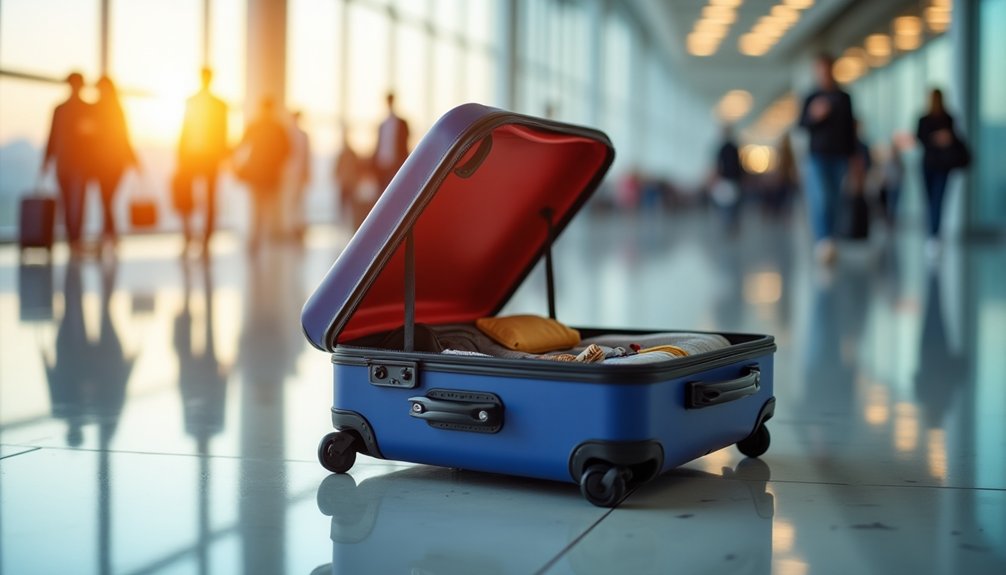Polypropylene suitcases can be a good option for you if you're looking for something lightweight and budget-friendly. They're perfect for short trips since they're easy to carry and offer decent impact resistance. However, keep in mind that they might not hold up as well under severe stress compared to polycarbonate varieties. If you travel infrequently and prefer affordability over durability, polypropylene's eco-friendly credentials and lightweight design suit your needs. Just remember, if you're a frequent traveler, looking into more durable options could be worthwhile for your long-term travel plans. Find out what suits your travel style best!
Key Takeaways
- Polypropylene suitcases are lightweight, enhancing packing capacity and making them ideal for budget-conscious travelers.
- They offer moderate impact resistance, but may crack under severe stress, limiting their durability.
- Best suited for short trips, polypropylene luggage may not withstand frequent travel demands effectively.
- Although affordable, they have a basic appearance and limited design options, which may not appeal to style-focused travelers.
- Eco-friendly and made from recyclable materials, they contribute to sustainability but still pose concerns over plastic pollution.
Understanding Polypropylene Luggage
When you consider luggage options, polypropylene suitcases often stand out for their lightweight design and affordability. Made from a flexible thermoplastic polymer, these suitcases are perfect for budget-conscious travelers seeking economical options for short trips.
The lightweight nature of polypropylene makes it easy to carry, allowing you to maneuver through busy airports or train stations effortlessly.
While they offer moderate impact resistance and shock absorbency, these suitcases can handle typical travel conditions without suffering significant damage. However, keep in mind that they may crack under severe stress, so if you're an infrequent traveler, this material might suit your needs just fine.
In terms of durability, polypropylene luggage is generally less resilient than polycarbonate alternatives, but it still performs adequately for occasional trips.
The basic appearance and limited design options may not appeal to those searching for stylish luggage, but practicality often takes precedence for casual travelers.
Additionally, polypropylene suitcases have been known to last up to 200 years in optimal conditions, but typical usage periods are significantly shorter due to wear and tear.
Note: The added sentence is integrated into the last paragraph.
Advantages of Polypropylene Suitcases
Polypropylene suitcases come with several advantages that make them a popular choice among travelers. First and foremost, they're incredibly lightweight, allowing you to maximize your packing capacity without worrying about airline weight limits. This feature is perfect if you often find yourself packing for short trips.
Additionally, polypropylene offers high chemical resistance, ensuring that your belongings are protected from spills and stains during various travel conditions. The flexibility of this material makes it impact-resistant, which means it's less likely to crack under the stress of typical travel. You can feel more confident tossing your suitcase around in busy airports or loading it into the trunk of your car.
Another significant advantage is affordability. Polypropylene suitcases are generally more budget-friendly than their polycarbonate counterparts, making them an excellent choice for occasional travelers or anyone looking for cost-effective luggage solutions.
While they may not match polycarbonate in terms of durability, they still provide decent longevity and performance for those short, infrequent trips. They also offer an eco-friendly alternative to traditional plastic materials, as they can be made from BPA-free plastics which makes them suitable for travelers who value sustainability.
Overall, polypropylene suitcases offer a blend of practicality and affordability that appeals to many travelers.
Limitations of Polypropylene Suitcases

While polypropylene suitcases offer several benefits, they do come with notable limitations that travelers should consider. Although these suitcases are lightweight and flexible, their durability can be a concern. Polypropylene may crack under severe stress, and its moderate impact resistance means fragile items mightn't be well-protected during travel.
If you're a frequent traveler, you might find that polypropylene luggage doesn't meet your needs, as it's better suited for short trips rather than extended journeys.
Additionally, the basic appearance and limited design options of polypropylene suitcases may not appeal to those looking for stylish luggage. You'll notice that they lack the aesthetic versatility offered by polycarbonate alternatives.
While these suitcases are attractive to budget-conscious travelers due to their affordability, this cost-saving comes at the expense of long-term travel performance. Furthermore, the environmental impact of polypropylene production and disposal is also a consideration, with the material contributing significantly to plastic pollution and ecosystem disruption.
If you plan to travel frequently or carry valuable fragile items, investing in more durable luggage might be a wiser choice.
Ultimately, while polypropylene suitcases have their advantages, weighing these limitations against your travel habits and needs is essential for making the right decision.
Comparing Polypropylene and Polycarbonate
Travelers often face a crucial choice between polypropylene and polycarbonate suitcases, each catering to different needs and preferences. Here's a quick comparison to help you decide:
1. Durability: Polycarbonate excels in Durability and impact resistance, making it ideal for frequent travelers who need robust protection.
Polypropylene, while lightweight, may crack under severe stress.
2. Weight: Both materials are lightweight, but polycarbonate offers a better strength-to-weight ratio, allowing for sturdier construction without significantly increasing weight.
3. Longevity: Polycarbonate typically has a longer lifespan than polypropylene, as its advanced material properties ensure better protection for fragile items during travel.
4. Aesthetic Appeal: If style matters to you, polycarbonate provides a wider range of design options and colors, appealing to style-conscious travelers.
In contrast, polypropylene usually has a basic appearance with limited choices.
Ultimately, your decision should align with your travel needs.
If you're a frequent traveler prioritizing durability and style, polycarbonate might be your best bet.
However, if you're looking for a lightweight option for short trips, polypropylene could be sufficient, especially considering its high melting point provides thermal stability in demanding environments.
Recommendations for Travelers

When it comes to choosing luggage, polypropylene suitcases are an excellent option for budget-conscious travelers. Their lightweight and flexible nature makes them easy to handle and perfect for short trips.
If you're a casual vacationer or a family planning a quick getaway, these suitcases, typically ranging from $90 to $180, provide an affordable price point without sacrificing functionality.
While polypropylene suitcases offer moderate impact resistance, keep in mind they may not withstand severe impacts as well as polycarbonate luggage. This makes them more suitable for infrequent travel rather than frequent flyers who need enhanced durability.
If you travel often, consider investing in polycarbonate options for added strength.
However, if you're mainly seeking a functional option for occasional trips, a polypropylene suitcase will serve you well. Their simple designs may not appeal to everyone, especially those looking for stylish luggage, but their practicality shines for those focused on value.
Additionally, polypropylene suitcases are made from a recyclable material, which contributes to their eco-friendliness and sustainability.
Ultimately, if you prioritize affordability and lightweight convenience for your travel needs, a polypropylene suitcase is a solid choice for short trips.
Frequently Asked Questions
Is Polypropylene Good for Suitcases?
Polypropylene's lightweight and flexible nature makes it a decent choice for casual trips. It's affordable and offers moderate impact resistance, but you might find it less durable for frequent travel compared to sturdier options.
Do Airlines Prefer Hard or Soft Luggage?
Airlines generally prefer hard luggage for checked bags because it offers better protection against impacts and moisture. Soft luggage suits carry-ons due to its flexibility, making it easier for you to stow in tight spaces.
What Is the Most Durable Material for Suitcases?
When choosing a suitcase, polycarbonate stands out for its durability, impact resistance, and lightweight nature. If you want something that withstands rough handling, polycarbonate's your best bet for reliable travel protection.
Is Polypropylene More Durable Than Polycarbonate?
No, polypropylene isn't more durable than polycarbonate. While it's lightweight and flexible, it cracks under severe impact. If you need robust luggage for frequent travel, polycarbonate's superior strength makes it the better choice.

